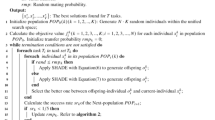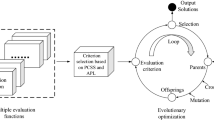Abstract
The advent of multifactorial optimization (MFO) has made a wind of change in intelligence computation in general and specifically in evolutionary computing. Based on the implicit parallelism of population-based search, MFO optimizes different problems simultaneously and entirely. However, the randomness of knowledge transfers raises the question of how to diminish harmful interactions among tasks for more effective transfers. In recent years, many proposals have been devised to handle this paradigm and improve existing algorithms. Notwithstanding the diversity in their concept, there are few efforts to solve many-task optimization (MaTO) that contains beyond three tasks. In light of this reason, this paper proposes two algorithms named SA-MFEA and LSA-MFEA for MaTO. Instead of utilizing fixed parameters, SA-MFEA and LSA-MFEA adapt the probability of random mating parameter to reduce negative transfers based on the historical memory of successful rmp. Besides, LSA-MFEA is capable of enhancing the exploitation by linear population size reduction. To examine the efficiency of the two proposed algorithms, experiments on various many-task benchmark problems and comparison with several state-of-the-art algorithms have been conducted. The results demonstrated that SA-MFEA and LSA-MFEA are competitive in terms of quality of solutions, convergence trend, and computation time.





Similar content being viewed by others
References
Bali KK, Ong YS, Gupta A, Tan PS (2019) Multifactorial evolutionary algorithm with online transfer parameter estimation: Mfea-ii. IEEE Trans Evol Comput 24(1):69–83
Binh HTT, Thangy TB, Long NB, Hoang NV, Thanh PD (2020) Multifactorial evolutionary algorithm for inter-domain path computation under domain uniqueness constraint. In: 2020 IEEE Congress on Evolutionary Computation (CEC), IEEE, pp 1–8
Chandra R, Gupta A, Ong YS, Goh CK (2016) Evolutionary multi-task learning for modular training of feedforward neural networks. In: International Conference on Neural Information Processing, Springer, pp 37–46
Chen Y, Zhong J, Feng L, Zhang J (2019) An adaptive archive-based evolutionary framework for many-task optimization. IEEE Trans Emerg Topics Comput Intell 4(3):369–384
Da B, Ong YS, Feng L, Qin AK, Gupta A, Zhu Z, Ting CK, Tang K, Yao X (2017) Evolutionary multitasking for single-objective continuous optimization: benchmark problems, performance metric, and baseline results. arXiv:170603470
Ding J, Yang C, Jin Y, Chai T (2017) Generalized multitasking for evolutionary optimization of expensive problems. IEEE Trans Evol Comput 23(1):44–58
Feng L, Zhou L, Zhong J, Gupta A, Ong YS, Tan KC, Qin AK (2018) Evolutionary multitasking via explicit autoencoding. IEEE Trans Cybern 49(9):3457–3470
Gupta A, Mańdziuk J, Ong YS (2015a) Evolutionary multitasking in bi-level optimization. Complex Intell Syst 1(1–4):83–95
Gupta A, Ong YS, Feng L (2015b) Multifactorial evolution: toward evolutionary multitasking. IEEE Trans Evol Comput 20(3):343–357
Gupta A, Ong YS, Feng L, Tan KC (2016) Multiobjective multifactorial optimization in evolutionary multitasking. IEEE Trans Cybern 47(7):1652–1665
Huynh TTB, Pham DT, Tran BT, Le CT, Le MHP, Swami A, Bui TL (2020) A multifactorial optimization paradigm for linkage tree genetic algorithm. Inf Sci 540:325–344
Jiang M, Huang Z, Qiu L, Huang W, Yen GG (2017) Transfer learning-based dynamic multiobjective optimization algorithms. IEEE Trans Evol Comput 22(4):501–514
Liang Feng KQ, Abhishek Gupta YY, Eric Scott YSO, Chi X (2020) New mto benchmarks for gecco 2020 competition on evolutionary multi-task optimization. http://www.bdsc.site/websites/MTO/index.html
Liaw RT, Ting CK (2017) Evolutionary many-tasking based on biocoenosis through symbiosis: a framework and benchmark problems. In: 2017 IEEE congress on evolutionary computation (CEC), IEEE, pp 2266–2273
Liaw RT, Ting CK (2019) Evolutionary manytasking optimization based on symbiosis in biocoenosis. Proc AAAI Conf Artif Intell 33:4295–4303
Lin J, Liu HL, Xue B, Zhang M, Gu F (2019) Multiobjective multitasking optimization based on incremental learning. IEEE Trans Evol Comput 24(5):824–838
Lin J, Liu HL, Tan KC, Gu F (2020) An effective knowledge transfer approach for multiobjective multitasking optimization. IEEE Trans Cybern 51(6):3238–3248
Sagarna R, Ong YS (2016) Concurrently searching branches in software tests generation through multitask evolution. In: 2016 IEEE symposium series on computational intelligence (SSCI), IEEE, pp 1–8
Tanabe R, Fukunaga A (2013) Success-history based parameter adaptation for differential evolution. In: 2013 IEEE congress on evolutionary computation, IEEE, pp 71–78
Tanabe R, Fukunaga AS (2014) Improving the search performance of shade using linear population size reduction. In: 2014 IEEE congress on evolutionary computation (CEC), IEEE, pp 1658–1665
Thang TB, Long NB, Hoang NV, Binh HTT (2021) Adaptive knowledge transfer in multifactorial evolutionary algorithm for the clustered minimum routing cost problem. Appl Soft Comput 105:107253
Wang C, Liu J, Wu K, Wu Z (2021) Solving multi-task optimization problems with adaptive knowledge transfer via anomaly detection. IEEE Trans Evol Comput
Zheng X, Qin AK, Gong M, Zhou D (2019) Self-regulated evolutionary multitask optimization. IEEE Trans Evol Comput 24(1):16–28
Zhou L, Feng L, Zhong J, Ong YS, Zhu Z, Sha E (2016) Evolutionary multitasking in combinatorial search spaces: a case study in capacitated vehicle routing problem. In: 2016 IEEE symposium series on computational intelligence (SSCI), IEEE, pp 1–8
Zhou L, Feng L, Tan KC, Zhong J, Zhu Z, Liu K, Chen C (2020) Toward adaptive knowledge transfer in multifactorial evolutionary computation. IEEE Trans Cybern 51(5):2563–2576
Acknowledgements
Ta Bao Thang was funded by Vingroup Joint Stock Company and supported by the Domestic Master/ PhD Scholarship Programme of Vingroup Innovation Foundation (VINIF), Vingroup Big Data Institute (VINBIGDATA), code VINIF.2020.ThS.BK.01. This research is supported by the International Technology Center Pacific (ITC-PAC) under Contract No. FA520919PA148.
Author information
Authors and Affiliations
Corresponding author
Additional information
Publisher's Note
Springer Nature remains neutral with regard to jurisdictional claims in published maps and institutional affiliations.
Rights and permissions
About this article
Cite this article
Thang, T.B., Dao, T.C., Long, N.H. et al. Parameter adaptation in multifactorial evolutionary algorithm for many-task optimization. Memetic Comp. 13, 433–446 (2021). https://doi.org/10.1007/s12293-021-00347-4
Received:
Accepted:
Published:
Issue Date:
DOI: https://doi.org/10.1007/s12293-021-00347-4




